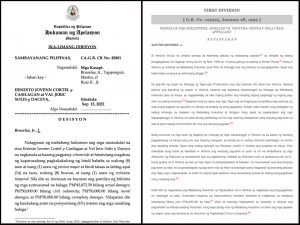Sen. Robin Padilla proposed using Filipino in court proceedings and rulings on Monday, September 20.
Many inmates do not comprehend why they were in jail because judgments were in English, said Padilla, who was convicted due to illegal possession of firearms but was pardoned by former Pres. Fidel Ramos.
RELATED: Robin Padilla surrenders guns with expired licenses to PNP
“Sorry po, ‘di naman po ako nag-di-discriminate pero halos 80 percent ng atin pong mga nakakulong, ‘di po nila naiintidihan talaga kung paano po sila sa hearing, kung paano po sila nasintensyahan, papa’no sila makakalabas,” the senator said at the finance committee hearing on the budget for the judiciary.
Less than a month after he assumed office, the neophyte senator also admitted that he struggled to keep up with fellow lawmakers who speak English during plenary debates.
RELATED: Robin Padilla told: ‘English also an official language’
Public opinion
Some agreed with Padilla that his proposal may help those in conflict with the law who have difficulty understanding English.
“To be fair naman to him, he has a point. ‘Di naman lahat ng inmates talaga understand English, especially if terms are very technical,” a Twitter user said.
“Aren’t we open to this? Not everyone has a strong command of English,” an online user argued.
“I agree with Sen. Robin Padilla. Not just the decisions but ALL OUR LAWS are in English. Does government authority really emanate from the people if it doesn’t speak our languages?” another wrote.
Others have a different take on Padilla’s suggestion.
Lawyer Emil Marañon III said it would be inconvenient to translate laws, rules, and regulations written in English.
“It is not only unnecessarily cumbersome to translate them in Tagalog, but nuances may be lost along the way,” he wrote in a tweet.
Marañon also argued that many non-native Tagalog speakers have difficulty expressing themselves in Tagalog compared with English.
“First, as much as we want to romanticize Tagalog as the assumed lingua franca, but the reality is while we non-native Tagalog speakers understand spoken Tagalog, most of us find it difficult to express ourselves in Tagalog that we would rather formally speak or write in English,” the lawyer said.
Maraño noted that it is the duty of the lawyer to help his or her client understand the court’s judgment.
Justice Roman del Rosario shared a similar idea about the duty of officers of the court.
“When we look into the law, the law is also written in English. Better to explain that the lawyers of parties are officers of the court. They have the responsibility to explain to their clients the case,” Justice Roman del Rosario said.
How court proceedings work
Assistant City Prosecutor and law professor Freddie Nojara, meanwhile, stressed how the court ensures that the accused understands the court proceedings and discussed how the judicial system works.
“During the arraignment, the accused will be formally apprised of the crime being charged against him. In the course thereof, he will be asked whether he understands the information which is written in English,” Nojara wrote in a Facebook post.
“If he does not, the court, through the interpreter, will translate the information to a language or dialect known to him,” he continued.
Before entering a plea, the court must ensure that the accused understands the charge against him.
“This is part of his right to be informed of the nature and cause of the accusation against him,” the law professor said.
When the accused testifies on his behalf during the trial, the questions asked in English are translated to the language known to the accused, Nojara said.
“Please remember that the quality of justice is not determined by the language used in any judicial proceeding but by the people in whose hands the administration of justice is lodged,” the law professor noted.
Supreme Court directive
There is a new directive from the Supreme Court which seeks to ensure that court proceedings would be held in Filipino or appropriate dialects that could be understood by the accused, Associate Justice Samuel Gaerlan said based on an ABS-CBN report.
Justice del Rosario, however, noted that changing the language used in court decisions would be drastic.
“Masyadong drastic na all decisions have to be written in Tagalog/Filipino when the documents presented in court, all laws are written in English,” del Rosario said.
There are already court decisions written in Filipino, as shared by lawyer Kenneth Manuel on Twitter.
These include the Supreme Court decision on the case of People v. Vinuya in 1999 and, more recently, the Court of Appeals decision on People v. Cortel.











